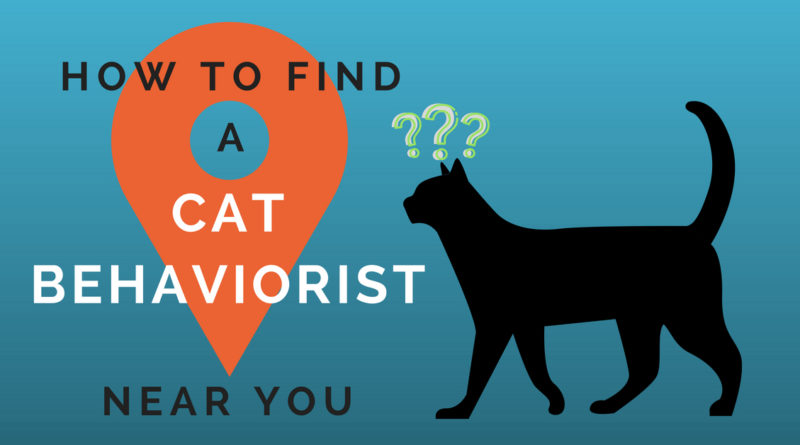How to Find a Cat Behaviorist Near You
If you’re having issues with your cat or your cat is having issues with you and other members of your family, it might be time to get professional help from a Cat Behaviorist. But finding a Cat Behaviorist in your area might be more challenging than you think. Over the past few months of dealing with inter-cat aggression issues in my home I've gone through the hassles of trying to find a Cat Behaviorist and in doing so I’ve learned a great deal about the profession.
And it really is a profession! Just last year I was under the impression that a “Cat Behaviorist” was synonymous for a “Pet Whisperer”. I thought it was a fancy name for someone who had above average cat skills. The only Cat Behaviorist I’d ever heard of was Jackson Galaxy. And I’ve since come to learn he’s not actually a certified Cat Behaviorist at all!
I was clearly misinformed about this rare profession. It turns out that it takes a good deal of post-graduate education and several years of training before you can become certified as a Veterinary Behaviorist or Animal Behaviorist.
Types of Cat Behaviorists
Before we direct you to the best places to find a Cat Behaviorist, we need to go over the basic types. That way you can be sure you’re getting the right level of professional help.
Veterinary Behaviorist
DACVB (Diplomate of the American College of Veterinary Behaviorists)
A Veterinary Behaviorist is a Veterinarian with specialized training in animal behavior. They are able to diagnose whether your cat’s problems are medical, behavioral, or a combination of both. They can also prescribe medications in addition to providing behavioral modification plans.
- Veterinarian (DVM or VMD)
- 3 Years of Training in Veterinary Behavior
- Authored a Published Research Project in the field
- Passed a 2-day Examination

Animal Behaviorist
CAAB (Certified Applied Animal Behaviorist)
An Animal Behaviorist that is certified through the Animal Behavior Society (ABS) is a professional with specialized training in animal behavior. Through the use of scientific principals, Animal Behaviorists diagnose and develop treatment plans to solve your cat’s behavioral issues. While they cannot prescribe mediations, they often work with Veterinarians who can.
- Doctoral Degree in Animal Behavior or related field
- 5 Years of professional experience in applied animal behavior
- Present a talk or poster at the Animal Behavior Society conference

Animal Behavior Consultants, Pet Whisperers, Trainers
Since this profession isn’t regulated and there are currently no licensure requirements, anyone can technically call himself or herself a Cat Behaviorist. Experience in Animal Behavior is incredibly valuable in this field. But experience alone may not be a good indication of expertise.
Which Type is Right for You?
It is usually a good idea to start off by talking to your Veterinarian. While studying Animal Behavior isn’t necessarily a requirement to become a Veterinarian, some have taken an interest in the subject and can be excellent resources. Your Veterinarian should also be able to rule out any underlying medical issues that could be causing your cat’s behavioral problems.
Veterinary Behaviorist ✅✅✅
If you’re lucky enough to live in proximity to a Veterinary Behaviorist (DACVB), we suggest you contact them first. There are only a handful of these highly qualified professionals in the United States and you’re pretty much guaranteed to get the best service from them.
Veterinary Behaviorists might have a higher hourly rate than your standard Animal Behaviorist, but you’ll be saving yourself a lot of time and money by not having to make a separate trip to the Veterinarian to get your prescriptions. Your Veterinary Behaviorist will be able to diagnose and treat your cat’s problems first-hand.
Here is a directory of all Veterinary Behaviorists in the United States:
Animal Behaviorist ✅✅
If a Veterinary Behaviorist is not available in your area, or if you have already ruled out medical issues with your cat’s primary Veterinarian, then a Certified Animal Behaviorist (CAAB) is your best bet. An Animal Behaviorist will work hand in hand with your Veterinarian to diagnose and develop a treatment plan.
Here’s a directory of all the Certified Animal Behaviorists in the United States:
Animal Behavior Consultants, Pet Whisperers, Trainers
This category of behaviorists is by far the most prevalent. Quality and level of experience can vary greatly. But that’s not to say there aren’t very capable animal behaviorists to be found. Jackson Galaxy is a perfect example of how a regular guy with loads of experience and no professional training or certifications is able to help hundreds of people with their cat behavior issues. If you do decide to select a behaviorist from this category, just make sure to do your research and always check with your Veterinarian to rule out medical causes first.




